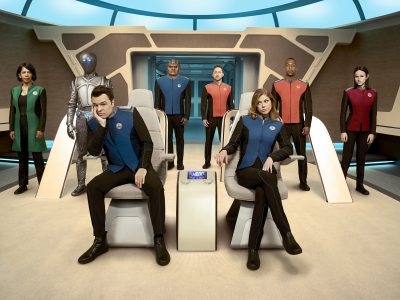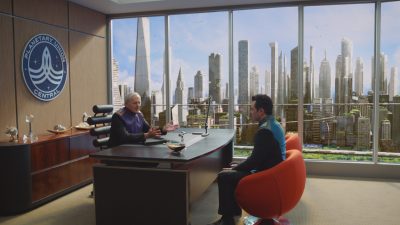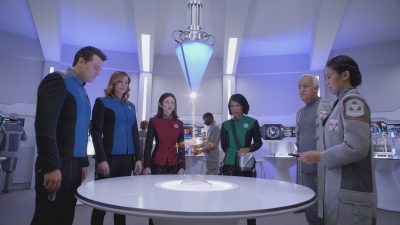
THE ORVILLE: L-R: Penny Johnson Jerald, Mark Jackson, Seth MacFarlane, Peter Macon, Scott Grimes, Adrianne Palicki, J. Lee and Halston Sage – Photo by Noah Schutz/Courtesy of FOX.
If you’re expecting FOX’s The Orville to be to Star Trek: The Next Generation what Galaxy Quest was to Star Trek: The Original Series, you will be disappointed.
Rather it’s like a tenth generation VHS copy. Squint and you can see TNG characters in the faces of The Orville’s crew, and the plots are reflections of the second Trek series – reflections being the operative word.
When Ed Mercer (series creator Seth MacFarlane) gets his first command he is thrilled – despite being told that he’s getting the promotion solely because there are too many ships for the Planetary Union to be particularly choosy.
We quickly meet his bridge crew – best friend and mouthy navigator Gordon Malloy (Scott Grimes); Bortus (Peter Macon), member of a single-gendered species that lays eggs but otherwise reminds of TNG’s Lt. Worf; John Lamarr (J. Lee), the only other navigator in the fleet who’s as good as Malloy; ship’s doctor Claire Finn (Penny Johnson Jerald), a font of wisdom as well as a brilliant doctor; Isaac (Mark Jackson), a robot AI who is totally bigoted against organic life forms, and security chief Alara Kitan (Halston Sage), who comes from a planet with twelve times the gravity of Earth – so, really, really strong.

THE ORVILLE: L-R: Guest star Victor Garber and Seth MacFarlane – Photo courtesy of FOX.
Mercer’s new command sets off to pick up its new Executive Officer, Kelly Grayson (Adrienne Palicki) – who happens to be Mercer’s ex (he caught her in bed with a blue alien and spent a year drinking and moaning).
The first three episodes address subjects that we’ve seen handled better in various iterations of Trek, and whatever mojo MacFarlane rustled up to play a really British jerk in Logan Lucky is gone. He’s the weak link in this cast – a wannabe Picard-type that’s too bland.
The show is mostly played straight – like MacFarlane’s inspiration, Star Trek – but still feels more than a bit off. The writing (one of the strengths of the various incarnations of Trek) is barely average – even after rescreening all three episodes, there are few memorable moments (one of which, featuring a green blob voiced by Norm Macdonald, is one of the gags featured in the promos for the series – so it’s already old by the time we see it in the premiere).
Technically, The Orville looks pretty great. Obviously, no expense was spared for the sets, makeup and effects. The Orville’s design reminds of Trek without slavishly copying it (just enough different to avoid lawsuits, like the series itself).

THE ORVILLE: L-R: Seth MacFarlane, Adrianne Palicki, Halston Sage, Penny Johnson Jerald, guest star Brian George and guest star Christine Corpuz in THE ORVILLE premiering this fall on FOX. ©2017 Fox Broadcasting Co. Cr: FOX
Of the first three episodes, the third, About a Girl, is the most ambitious – dealing with gender identity as it does – but never really reaches the levels of an average Trek episode (let alone a great one). It does have one terrific moment in court sequence – one of a handful of such moments of inspiration over those three episodes.
Where The Orville succeeds is in its earnestness and optimism. MacFarlane’s love of Trek’s positivity shines through the show’s overall mediocrity.
If MacFarlane had Family Guy’d the show a bit, it might have had more brass. As it is, it’s a perfectly innocuous hour of television. In an era of Peak TV that probably won’t be enough to keep it on the air.
Final Grade: C-